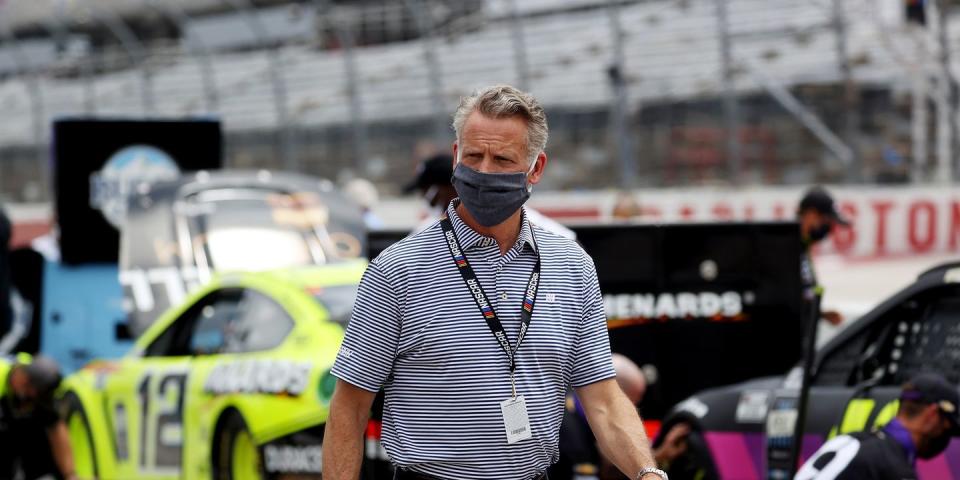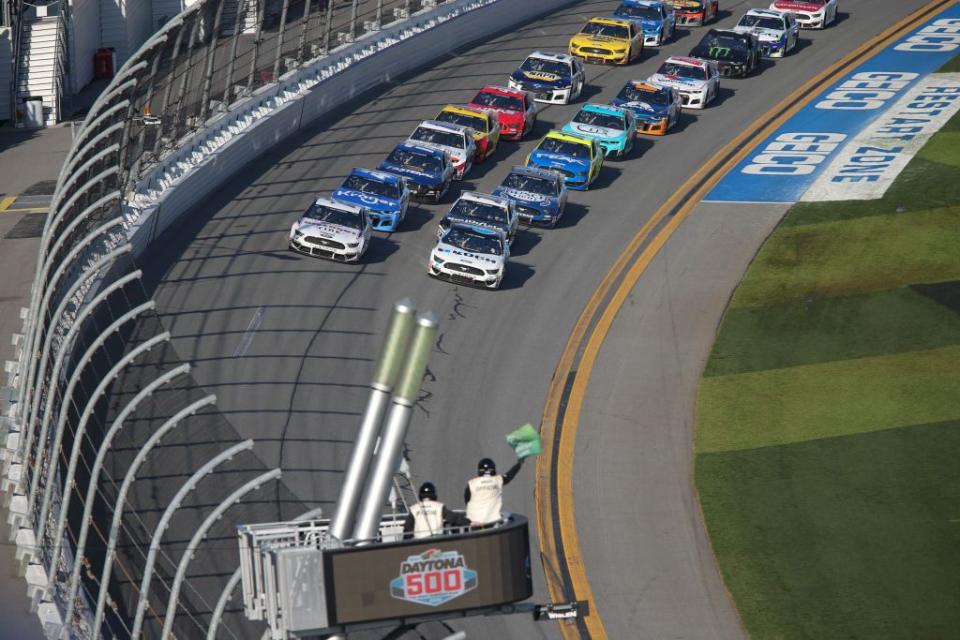NASCAR President Touts Health of Sport Through Tumultuous 2020

In conducting his third state of the sport address on Saturday at Phoenix Raceway, NASCAR president Steve Phelps has successfully navigated a season unlike anything his predecessors have ever faced.
No matter the television ratings or debates about the on-track product, simply reaching the Season Finale 500 on Sunday is an accomplishment worth celebrating, even as NASCAR’s chief executive begins dutifully preparing for the possible challenges of 2021.
The COVID-19 pandemic threatened to shorten or outright cancel the 2020 season -- an outcome that would have crippled the racing economy.
Instead, NASCAR has reached 38 Cup Series events, 33 in the Xfinity Series and 23 for the Truck Series. While a handful of races contained only a scant number of fans, and others none whatsoever, it was important for NASCAR to fulfill the television contract requirements that kept the industry at work.
Even though the Next-Gen car will be delayed to 2021, NASCAR continued its development throughout the shutdown, and even got the car back on track when it became permissible during the summer months.
Perhaps more importantly, Phelps and his lieutenants made good on a promise to radically change the Cup Series schedule -- producing a 2021 campaign that includes a dirt race, six road courses and an eventual reconfiguration of Auto Club Speedway into a half-mile short track.
There has been continued conversation about budget caps and cost containment during his two-and-a-half-year tenure at the helm under elusive league chairman Jim France, the youngest son of NASCAR founder Bill France Sr.
These initiatives became even more important with the pandemic and the inability to host sponsors on a weekly basis.
While the Cup Series will lose Germain Racing and Leavine Family Racing to a lack of sponsorship, those teams will be replaced by 23XI Racing and Trackhouse Racing -- organizations that at least intend to compete at similar levels to the cars they replaced.
And then there’s the ownership charters, a program that can’t totally be judged until the new car settles, a complimentary component to NASCAR’s Next Generation business model.
A selection of the most important quotes and statements from Phelps can be found below.

Does NASCAR intend to have a normal Daytona 500?
"Do I believe we're going to have fans in the stands? I do. What percentage of fans in the stands? I'm not sure. Will we have folks in the garage, fans in the garage? I don't know. What I would say is I can't wait till we do have fans back in the garage.
"The hallmark of our sport is about accessibility to the garage, accessibility to the drivers, the crews. We don't have that. We don't have that because we need to keep people safe. That's the only way we're going to run a race is if we're going to keep people safe.
"I don't know. I do know that we have every intention of running on February 14th the 500. Our plan is to race in front of fans."
Will NASCAR's business be viable in 2021 with limited attendance?
"Will everyone's bottom line look more challenged? The answer is yes. Do I believe we as a sport are going to shut down? We are not. We are going to run races. We can sustain this period where we have a limited number of fans, limited amounts of hospitality.
"Is it where we want to be? Of course not. But are we financially viable to move forward? We are. Do I think the majority of our race teams are in the same position? I do. If you look at where we are from a viewership standpoint, our viewership has been phenomenal, right? Particularly in a relative basis. In an absolute basis I think so, as well.
"Visibility for sponsors on race cars, they're in a good place. Obviously the B to B portion of it is a little bit more challenged. But do I think that we will weather the storm as a sport if things continue much like they have this year? The answer is yes, we are going to persevere and we are going to continue to put on races, bring that great racing to the fan base."
Can NASCAR survive a federally mandated shutdown?
"Will we scenario plan for all the things we can identify? The answer is yes, we are going to. I think we showed this year as a sport that we did as good or a better job than any sport did, frankly, getting back early and often.
"I believe as of tomorrow we'll be the only sport that finished a full season. The NFL is obviously in the midst of theirs. We are hopeful that they continue with their progress and finish their season. But as of now, as of tomorrow, we're the only major sport that finished a full season. Certainly proud of that.
"What happens in the future is difficult to say because we don't know what it looks like, don't know whether it's going to be federal, local. As of now we're going to go to Daytona and run the Daytona 500 on February 14th, then we're going to adjust as needed based on what things are thrown at us."
Could the Next Gen car get postponed to 2023?
"It's hard to say. We are on schedule. John Probst and his team have done a great job working with our OEMs, with our teams, to get us to a place where we feel confident where things are.
"I just think the hard part is we were confident that we were going to introduce it in 2021. Then it became very clear that we couldn't. It really has to do with are we going to have the parts and pieces in order to make this car, to build it at scale in order to have enough cars to race. As of right now the answer is absolutely yes.
"Our guys are excited about it. I think we all are excited about it. We've seen some renderings. It's a cool-looking car that I think will have some great characteristics that will make the racing even better than we've seen this year. Again, it's hard to predict the future. Given the things we know today, we're in good shape.
Has the pandemic challenged talks with potential OEMs?
"We haven't had a ton of conversations with other OEMs during the COVID situation. They've kind of had their own issues with supply chains, making sure they're getting vehicles out.
"When the season ends, we'll start to kind of restart those conversations. Only a certain number of hours in a day. Those have taken a little bit of a step back, at least a pause, not a step back, but a pause. I think we'll ramp those discussions back up.
Again, I'll go back to it. I think we are actually a more attractive sport today to a new OEM than we were back in March. I believe that to be true. It's not that we were not an attractive sport for them to make investments in our sport, but I think now more than ever."
Would a new OEM result in an increase in ownership charters?
"We have the opportunity to do that. Again, someone coming in wouldn't come in, I would suggest, until probably 2023 at the earliest. I think the world is just going to look a lot different at NASCAR once you get to kind of the NextGen car. Just the dynamics are going to change so significantly.
"If we deem it would be in the best interest of the sport to add an additional charter or two to try to help jump start a new OEM, it's something we'd consider."
Is the charter system working as devised?
"One of the thoughts on the business side: If someone decided to leave a sport, they would have enterprise value that they'd be able to sell their race car or race team and make some money.
"I think that's something that is happening in this system. It's not the only reason why the charter system exists. I think there are things about the charter system that work quite well. There are others that I think we could probably improve on moving forward.
"It's something that we're not faced with at this particular time. The charters go through 2024. Again, I think it's working well in some cases. Again, as I said, in other cases I think there are some things that we would look to change moving forward."

 Yahoo Autos
Yahoo Autos 